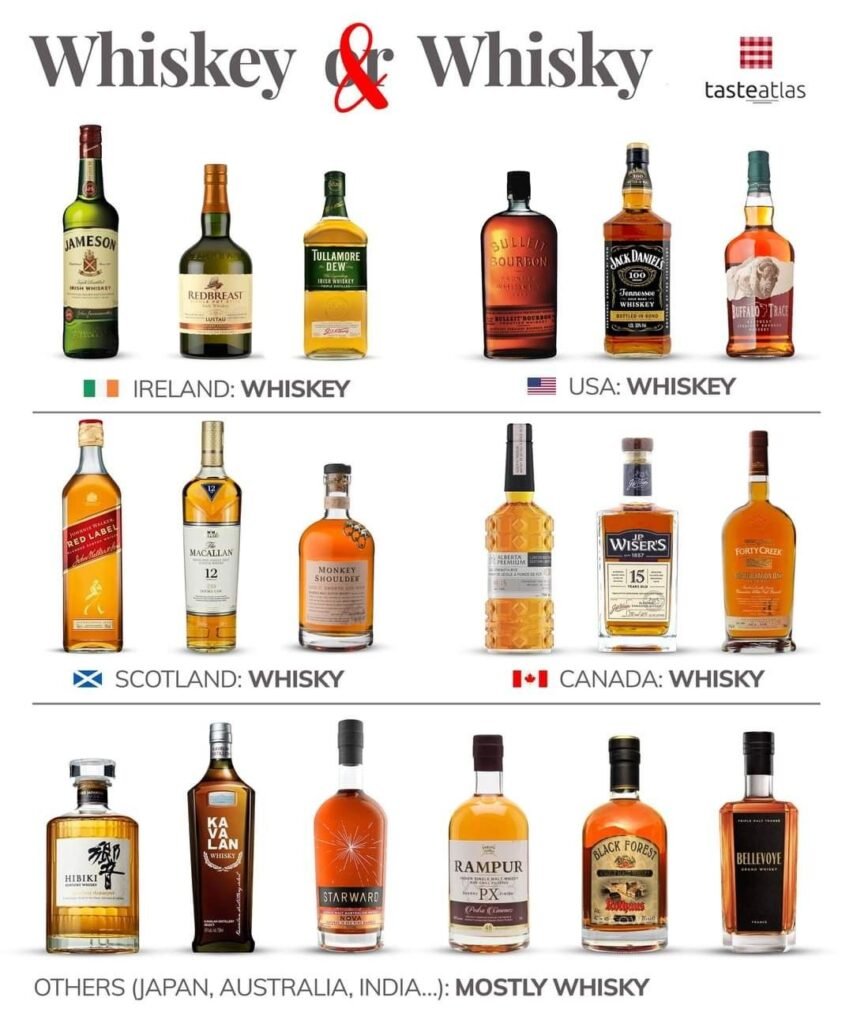Whisky is a timeless spirit enjoyed worldwide, but does it have a shelf life? Many whisky enthusiasts wonder if that dusty bottle of whisky will remain good indefinitely or if it could eventually spoil. Let’s dive into everything you need to know about whisky’s lifespan, from unopened bottles to partially consumed ones. We’ll explore common misconceptions, signs of spoilage, and how to preserve your whisky collection to enjoy its flavors for years to come.
What Happens to Whisky Over Time?
Whisky is unique in that it doesn’t spoil or expire in the traditional sense like milk or other perishable foods. This is largely due to its high alcohol content, which helps to preserve it over time. However, the quality of whisky can change over time if not stored properly.
Does Whisky Age in the Bottle?
Unlike wine, which matures and changes in flavor over time in the bottle, whisky does not age once bottled. The aging process occurs exclusively in the barrel, where whisky gains most of its flavor, color, and character. Once bottled, whisky essentially “pauses” and maintains the qualities it had at the time of bottling
The Role of Barrels in Aging
The flavor complexity in whisky develops while it’s in the barrel. Barrels allow oxygen to interact with the whisky and absorb various flavors from the wood, giving it its depth and smoothness. Barrel aging is where the true “magic” happens in whisky-making.
Why Whisky Doesn’t Age in the Bottle
Once bottled, whisky is sealed off from oxygen and the unique barrel environment that transforms it. This stops the aging process. So, even if you have a bottle from decades ago, its taste and quality will be the same as the day it was bottled.

How Long Can an Unopened Bottle of Whisky Last?
Storage Conditions for Unopened Whisky
Unopened whisky can last indefinitely if stored in ideal conditions. But keep in mind that factors like temperature, light exposure, and air can still subtly affect whisky over time.
Temperature
Store whisky in a cool, consistent environment, ideally between 15-20°C (59-68°F). Fluctuating temperatures can affect the liquid over time.
Light Exposure
Direct sunlight is the enemy of whisky. Exposure to light can break down the compounds in whisky, causing color and flavor changes.
Humidity and Air Exposure
Whisky bottles with compromised seals or corks are more vulnerable to air exposure, which can lead to subtle oxidation over time.
Signs That Whisky Has Gone Bad
Physical Indicators of Spoiled Whisky
Look out for unusual cloudiness, particles floating in the liquid, or a change in color. These might indicate that the whisky has degraded, although spoilage is rare.
Flavor and Aroma Changes
If your whisky smells or tastes noticeably different, it may be a sign of oxidation. Whisky that’s lost its rich aroma or tastes flat has likely been affected by air.
The Impact of Opening a Bottle on Whisky Quality
Oxidation and Its Effects on Whisky
When a bottle of whisky is opened, oxygen enters the bottle. Over time, this oxygen can affect the flavor, creating a slightly duller taste.
How Long Does Opened Whisky Last?
An opened bottle of whisky can last anywhere from 6 months to 2 years if stored properly. Higher levels of oxygen in a nearly empty bottle will speed up flavor loss, so aim to consume it sooner for the best taste.
Preserving Flavor in Open Bottles
To slow oxidation, keep your opened whisky tightly sealed and store it upright. Minimizing the amount of air in the bottle can also help preserve the flavor.
Proper Storage Tips for Whisky
Ideal Storage Environments
A dark, cool, and stable environment is best for storing whisky. The less exposure to elements, the better it will retain its quality.
Practical Tips for Everyday Whisky Lovers
Try to keep whisky bottles upright and away from the kitchen or places with temperature fluctuations. Basements, wine cellars, or cupboards are often ideal storage spots.
Common Misconceptions About Whisky Expiry
Misunderstanding “Best Before” vs. “Expired”
Whisky bottles may display a “best before” date, but this is more about quality rather than safety. Whisky does not expire in a way that makes it harmful.
Myth-Busting Expiration Myths Around Whisky
Contrary to popular belief, whisky doesn’t need to be finished within a set period. While flavors may change, it’s rare for whisky to truly “go bad.”
Does Whisky Taste Better with Time?
The Difference Between Aging and Oxidizing
Remember, whisky only ages in barrels. Aging and oxidizing are different processes, and after bottling, the whisky will slowly oxidize rather than age.
When to Drink vs. When to Store
If you’re holding onto a bottle for a special occasion, you don’t have to worry about it spoiling. Just ensure it’s stored properly to retain its original taste.
What Happens to Old, Collectible Whisky?
The Market for Vintage Whisky
Vintage whisky has a high value among collectors, and some bottles increase in worth over the years. However, quality preservation is essential for maintaining market value.
Risks of Storing Whisky for Too Long
With time, even collectible whisky might lose its flavor, especially if improperly stored. Knowing how to store it correctly can keep it pristine for longer.

Here are 10 of the best whiskies, loved by connoisseurs and ideal for a range of palates and preferences:
- Macallan Sherry Oak 18 Years
- A luxurious single malt from Scotland, known for its rich flavors of dried fruit, chocolate, and spice, thanks to its aging in sherry-seasoned oak casks.
- Yamazaki 12-Year-Old
- Japan’s most iconic whisky, with smooth, complex notes of honey, apricot, and a slight hint of smoke, perfect for fans of subtle, balanced profiles.
- Lagavulin 16-Year-Old
- A powerful, smoky single malt from Islay, Scotland, famous for its peaty, bold flavors complemented by hints of dried fruit and vanilla.
- Redbreast 12-Year-Old
- An Irish favorite with a smooth, creamy texture and flavors of spice, vanilla, and toasted oak, making it an approachable yet complex choice.
- Highland Park 18-Year-Old
- A well-rounded Scotch from the Orkney Islands, offering a mix of honey sweetness, gentle smoke, and earthy undertones.
- Glenfiddich 21-Year-Old Reserva Rum Cask Finish
- A unique offering aged in Caribbean rum casks, giving it a rich, exotic flavor with hints of banana, toffee, and fig.
- Bulleit Bourbon Frontier Whiskey
- A high-rye bourbon from Kentucky, known for its bold spiciness, with notes of vanilla, cinnamon, and nutmeg for a balanced experience.
- Talisker 10-Year-Old
- A coastal, maritime single malt from the Isle of Skye, Scotland, with briny, smoky flavors and a peppery kick that whisky lovers adore.
- Johnnie Walker Blue Label
- A premium blended Scotch whisky with a smooth, rich taste profile featuring hints of hazelnut, dark chocolate, and a whisper of smoke.
- GlenDronach 18-Year-Old Allardice
- A sherried Scotch whisky known for its full-bodied richness, featuring flavors of dark fruit, chocolate, and a touch of leather.
Conclusion
Whisky is a resilient spirit with a virtually unlimited shelf life when stored properly. While it doesn’t truly expire, certain conditions can alter its flavor and quality over time. By understanding whisky’s aging process, how to store it correctly, and the effects of oxidation, whisky lovers can ensure they’re getting the best experience from every bottle. So, whether you’re a casual sipper or a collector, you can now savor every glass with confidence!
Each of these whiskies brings unique flavors, stories, and character to the glass, making them some of the best choices to explore!
FAQs
Does whisky get stronger with age?
No, whisky doesn’t become stronger once bottled. Its alcohol content and flavor remain the same as when it was bottled.
Can you get sick from drinking old whisky?
No, old whisky is safe to drink if it’s been stored properly. It may lose flavor but won’t become harmful.
Should I refrigerate whisky?
Refrigeration isn’t necessary for whisky. Just store it in a cool, dark place.
Can whisky grow mold?
In rare cases, mold may form around the cork if exposed to too much humidity, but it’s uncommon.
How do I know if my whisky is still good?
Check the aroma and taste. If it’s flat or smells off, it may have degraded but isn’t harmful.

